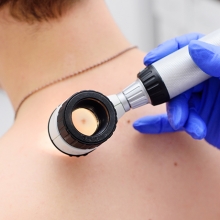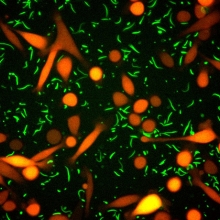Milvia Perinot and Prof. Michal Neeman
A partnership that is advancing cancer imaging research
People behind the science

Prof. Michal Neeman and Milvia Perinot
After years of navigating across a multitude of country lines and languages in Europe with her late partner, Italian-born Milvia Perinot has found a home at the Weizmann Institute of Science.
“I think research is the future for every one of us,” she says. “I came here and fell in love.”
While Milvia has become one of the foremost supporters of cancer research at the Institute, her path from the northeastern mountains of Italy to south-central Israel has been far from ordinary.
During a post-graduation summer holiday in 1961 at age 18, she and a friend were relaxing on a bench along the northern Italian coast when three young men in an Alfa Romeo Spider pulled up beside them. The least dapper, but most intriguing, of the trio—according to Milvia—sported long hair and uncharacteristically causal clothes for the Italy of the 1960s. This was Henry Krenter, who became her life partner.
The couple spent nine months out of every year traveling across Europe for the refrigeration company that Henry represented, taking turns navigating and driving through the rolling green hills and rustic villages of Ireland, Austria, Switzerland, Belgium, Great Britain, and France. While they ultimately ended up settling with Henry’s parents in Lugano, Switzerland—where she lives today—it was Israel that always remained on Henry’s mind.
Born in Dresden, Germany, and raised primarily in Yugoslavia, Henry and his parents escaped on the eve of the Nazi invasion in 1941, boarding a train bound for Palestine. Henry spent his teenage years in Tel Aviv, and lied about his age in order to join the army in 1948 and fight in the War of Independence. After working as a salesman in a Judaica factory in Tel Aviv, he left Israel in 1951 to join his mother and father in Trieste, Italy. But Israel always stayed with him, and he frequently expressed to Milvia his desire to return. He came back only once, in 1996, for a four-day trip with Milvia.
After a brave struggle with lung cancer, Henry passed away in 2008 and Milvia made it her mission to fulfill her beloved partner’s dream. With the help of longtime Israeli friends, she buried Henry at Kibbutz Einat. Describing the kibbutz as a “Garden of Eden,” filled with flowers, trees, and birds, Milvia makes a point of visiting Henry’s gravesite there daily during her now-frequent visits to Israel.
Milvia also wanted to ensure that Henry’s legacy would positively influence the country he so loved, through the foundation they established together, Fondazione Henry Krenter. She found the Weizmann Institute to be the perfect place to honor his memory, and she naturally chose to support cancer research. She herself had overcome endometrial carcinoma in 2005, and her nephew succumbed to kidney cancer the next year.
She established the Henry Chanoch Krenter Institute for Biomedical Imaging and Genomics in 2012, headed by Prof. Michal Neeman, Weizmann Institute Vice President, whose research in the Department of Biological Regulation focuses on angiogenesis—the formation of blood vessels—using magnetic resonance and optical imaging. She concentrates on ovarian cancer and has demonstrated that the hormonal changes accompanying menopause can indirectly promote the growth of dormant tumors and the spread of cancer, by inducing the growth of blood vessels that nourish these tumors. Prof. Neeman pioneered a method for tracking blood and lymphatic vessels to help scientists better understand how to suppress vessel growth and dormancy, thereby boosting survival rates among ovarian cancer patients.
Dozens of projects have benefited from the support of the Krenter Institute, paving the way for groundbreaking advancements in cancer research. As one example, Prof. Karina Yaniv received funding to advance her studies on the origins of the lymphatic system and its role in cancer metastasis; she is uncovering the origins of lymphatic vessels during embryonic development and the molecular players involved in this process. Such knowledge may prove valuable for treating lymphatic-related diseases and controlling the spread of metastatic tumors.
“I hope with all my heart that they will be able to find something to help cure cancer, here at the Weizmann Institute,” Milvia says. “My heart is in this country,” she says.
Milvia also gives to other areas at the Weizmann Institute, and recently funded a PhD scholarship for women, with the first recipient Chen Attias, a PhD student in the Department of Computer Science and Applied Mathematics.
While cementing her role in this critical scientific endeavor, Milvia also quickly developed a personal connection with Prof. Neeman.
“Milvia joined the Weizmann family and captured my heart with her curiosity and passion for science, and her wisdom and love of humanity and nature,” Prof. Neeman says. “With her modest kindness and love she is able to move mountains and break through any wall. Her drive and encouragement made her a partner in the Weizmann effort to understand and fight cancer.”
Says Milvia, “I don’t have enough words to [describe] Michal. To me, to be like her would be a prize in life.”
Prof. Michal Neeman heads the following centers and institutes: The Dimitris N. Chorafas Institute for Scientific Exchange, The Crown Institute for Genomics, The De Botton Institute for Protein Profiling, The Dolfi and Lola Ebner Center for Biomedical Research, The J&R Center for Scientific Research, The Morris Kahn Institute for Human Immunology, The Henry Krenter Institute for Biomedical Imaging and Genomics, The Jeanne and Joseph Nissim Center for Life Sciences Research, the Sagol Institute for Longevity Research, The David and Fela Shapell Family Institute for Preclinical Studies, The Wertheimer Center for Computational Biology, The Willner Family Leadership Institute, The Maurice and Vivienne Wohl Institute for Drug Discovery, and The Yeda-Sela (YeS) Center for Basic Research. She is supported by the European Research Council and the David and Fela Shapell Family Foundation G-INCPM Fund for Preclinical Studies. Dr. Neeman is the incumbent of the Helen and Morris Mauerberger Professorial Chair in Biological Sciences.








